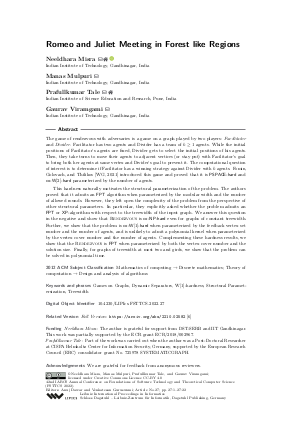Romeo and Juliet Meeting in Forest like Regions
Authors
Neeldhara Misra  ,
Manas Mulpuri,
Prafullkumar Tale,
Gaurav Viramgami
,
Manas Mulpuri,
Prafullkumar Tale,
Gaurav Viramgami
-
Part of:
Volume:
42nd IARCS Annual Conference on Foundations of Software Technology and Theoretical Computer Science (FSTTCS 2022)
Part of: Series: Leibniz International Proceedings in Informatics (LIPIcs)
Part of: Conference: IARCS Annual Conference on Foundations of Software Technology and Theoretical Computer Science (FSTTCS) - License:
 Creative Commons Attribution 4.0 International license
Creative Commons Attribution 4.0 International license
- Publication Date: 2022-12-14
File

PDF
LIPIcs.FSTTCS.2022.27.pdf
- Filesize: 5.6 MB
- 22 pages
Document Identifiers
Related Versions
- Full Version https://arxiv.org/abs/2210.02582
Subject Classification
ACM Subject Classification
- Mathematics of computing → Discrete mathematics
- Theory of computation → Design and analysis of algorithms
Keywords
- Games on Graphs
- Dynamic Separators
- W[1]-hardness
- Structural Parametersization
- Treewidth
Metrics
- Access Statistics
-
Total Accesses (updated on a weekly basis)
0Document
0Metadata
Abstract
The game of rendezvous with adversaries is a game on a graph played by two players: Facilitator and Divider. Facilitator has two agents and Divider has a team of k ≥ 1 agents. While the initial positions of Facilitator’s agents are fixed, Divider gets to select the initial positions of his agents. Then, they take turns to move their agents to adjacent vertices (or stay put) with Facilitator’s goal to bring both her agents at same vertex and Divider’s goal to prevent it. The computational question of interest is to determine if Facilitator has a winning strategy against Divider with k agents. Fomin, Golovach, and Thilikos [WG, 2021] introduced this game and proved that it is PSPACE-hard and co-W[2]-hard parameterized by the number of agents. This hardness naturally motivates the structural parameterization of the problem. The authors proved that it admits an FPT algorithm when parameterized by the modular width and the number of allowed rounds. However, they left open the complexity of the problem from the perspective of other structural parameters. In particular, they explicitly asked whether the problem admits an FPT or XP-algorithm with respect to the treewidth of the input graph. We answer this question in the negative and show that Rendezvous is co-NP-hard even for graphs of constant treewidth. Further, we show that the problem is co-W[1]-hard when parameterized by the feedback vertex set number and the number of agents, and is unlikely to admit a polynomial kernel when parameterized by the vertex cover number and the number of agents. Complementing these hardness results, we show that the Rendezvous is FPT when parameterized by both the vertex cover number and the solution size. Finally, for graphs of treewidth at most two and girds, we show that the problem can be solved in polynomial time.
Cite As Get BibTex
Neeldhara Misra, Manas Mulpuri, Prafullkumar Tale, and Gaurav Viramgami. Romeo and Juliet Meeting in Forest like Regions. In 42nd IARCS Annual Conference on Foundations of Software Technology and Theoretical Computer Science (FSTTCS 2022). Leibniz International Proceedings in Informatics (LIPIcs), Volume 250, pp. 27:1-27:22, Schloss Dagstuhl – Leibniz-Zentrum für Informatik (2022)
https://doi.org/10.4230/LIPIcs.FSTTCS.2022.27
BibTex
@InProceedings{misra_et_al:LIPIcs.FSTTCS.2022.27,
author = {Misra, Neeldhara and Mulpuri, Manas and Tale, Prafullkumar and Viramgami, Gaurav},
title = {{Romeo and Juliet Meeting in Forest like Regions}},
booktitle = {42nd IARCS Annual Conference on Foundations of Software Technology and Theoretical Computer Science (FSTTCS 2022)},
pages = {27:1--27:22},
series = {Leibniz International Proceedings in Informatics (LIPIcs)},
ISBN = {978-3-95977-261-7},
ISSN = {1868-8969},
year = {2022},
volume = {250},
editor = {Dawar, Anuj and Guruswami, Venkatesan},
publisher = {Schloss Dagstuhl -- Leibniz-Zentrum f{\"u}r Informatik},
address = {Dagstuhl, Germany},
URL = {https://drops.dagstuhl.de/entities/document/10.4230/LIPIcs.FSTTCS.2022.27},
URN = {urn:nbn:de:0030-drops-174194},
doi = {10.4230/LIPIcs.FSTTCS.2022.27},
annote = {Keywords: Games on Graphs, Dynamic Separators, W\lbrack1\rbrack-hardness, Structural Parametersization, Treewidth}
}
Author Details
Funding
- Misra, Neeldhara: The author is grateful for support from DST-SERB and IIT Gandhinagar. This work was partially supported by the ECR grant ECR/2018/002967.
- Tale, Prafullkumar: Part of the work was carried out when the author was a Post-Doctoral Researcher at CISPA Helmholtz Center for Information Security, Germany, supported by the European Research Council (ERC) consolidator grant No. 725978 SYSTEMATICGRAPH.
Acknowledgements
We are grateful for feedback from anonymous reviewers.
References
- Karl Bringmann, Danny Hermelin, Matthias Mnich, and Erik Jan van Leeuwen. Parameterized complexity dichotomy for steiner multicut. J. Comput. Syst. Sci., 82(6):1020-1043, 2016. URL: https://doi.org/10.1016/j.jcss.2016.03.003.
- Marek Cygan, Fedor V. Fomin, Lukasz Kowalik, Daniel Lokshtanov, Dániel Marx, Marcin Pilipczuk, Michal Pilipczuk, and Saket Saurabh. Parameterized Algorithms. Springer, 2015. URL: https://doi.org/10.1007/978-3-319-21275-3.
-
Reinhard Diestel. Graph Theory, 4th Edition, volume 173 of Graduate texts in mathematics. Springer, 2012.

- Fedor V. Fomin, Petr A. Golovach, and Dimitrios M. Thilikos. Can romeo and juliet meet? or rendezvous games with adversaries on graphs. In Lukasz Kowalik, Michal Pilipczuk, and Pawel Rzazewski, editors, Graph-Theoretic Concepts in Computer Science - 47th International Workshop, WG 2021, Warsaw, Poland, June 23-25, 2021, Revised Selected Papers, volume 12911 of Lecture Notes in Computer Science, pages 308-320. Springer, 2021. URL: https://doi.org/10.1007/978-3-030-86838-3_24.
-
M. R. Garey and David S. Johnson. Computers and Intractability: A Guide to the Theory of NP-Completeness. W. H. Freeman, 1979.

- Neeldhara Misra, Manas Mulpuri, Prafullkumar Tale, and Gaurav Viramgami. Romeo and juliet meeting in forest like regions, 2022. URL: https://doi.org/10.48550/arXiv.2210.02582.
